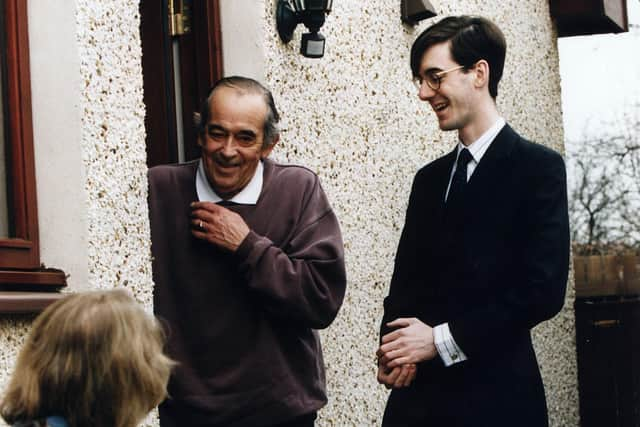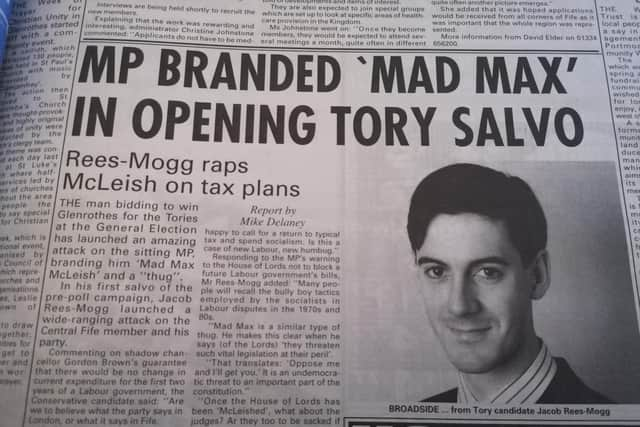Jacob Rees-Mogg: 25 years ago he campaigned for votes in Fife with his nanny
and live on Freeview channel 276
The then 27-year old was handed the toughest patch as a rookie candidate which took him across Glenrothes and Leven in 1997.
Wherever he went he was trailed by the media who were fascinated by the exceptionally posh, immaculately turned out, polite gent from London, seeking a first foothold in his political career.
Advertisement
Hide AdAdvertisement
Hide AdHis chances were, to be honest, non-existent. Back then, Central Fife was a Labour heartland, and he was up against two formidable opponents - sitting MP Henry McLeish who went on to be First Minister, and future MSP and Presiding Officer of the Scottish Parliament, Tricia Marwick, standing for the SNP for a second time.


The ballot also included Ross Laird for the Lib Dems, and Johnny Wedderburn-Scrimgeour for the Referendum Party.
Mogg certainly put in the effort door knocking, although he did himself no favours buy not attending the first public hustings, citing “work commitments” for his non-appearance.
The gulf between the would-be politician and the people was only underlined when he was joined on the campaign trail by his father, William Rees-Mogg, editor of The Times, and one time High Sheriff of Somerset.
Advertisement
Hide AdAdvertisement
Hide AdRees-Mogg Jnr opted to deliver a howitzer of an attack in his first press release, branding McLeish “Mad Max McLeish” and, bizarrely, “a thug” in a wide ranging attack on the politician and his party. The ‘thug’ jibe came in response to a Labour warning to the House of Lords not to block legislation.


Mogg was having none it: “Once the House of Lords are ‘McLeished’ what about the judges? Are they too to be sacked if they won’t jump through his hoops. This is what socialists did in other countries, and it is a sure route to tyranny and despotism.”
Stirring stuff, but it turned out Mogg had some socialist leanings of his own, as he revealed in an interview with the late Mike Delaney for the Glenrothes Gazette.
Will the constituents have much in common with you, he was asked.
Advertisement
Hide AdAdvertisement
Hide Ad“Yes, I think they will. What they would have in common with me are beliefs rather than background. Belief in the importance of the individual and of Britain as a nation which is not part of a federal Europe or split up into its constitutional parts.”
Mike compared him to a character in The Kinks’ song ‘Well Respected Man’ - the one who prided himself on “doing the best things so conservatively.”
Did he ever think of rebelling?
“I never thought of being in a rock group - I’ll leave that to Tony Blair - but I was a great supporter of Harold Wilson. My nanny told me Labour was going to give money to the poor. As I was only five years old and didn’t have any money, I thought this was a great idea, but I never got any, and I realised that a Labour government never keeps its promise.”
Little wonder then that Mogg joined the Tories at the age of just 12.
Advertisement
Hide AdAdvertisement
Hide AdHe said he stood in Scotland because he believed in the union. In truth, he was only following a route familiar to all MPs handed a hopeless seat first time round.
He went on to blame Scotland’s dependency culture - “the idea that if you have a problem the first thing you do is turn to the council or government” - partly for the Torie’ unpopularity north of the border.
And he wasn’t in favour of a minimum wage- he claimed such a move would lead to one million job losses, 1500 of them in Central Fife.
Suffice to day, it didn’t chime with voters. Mogg saw the Tory vote cut in half. He polled just 3669 votes - well down on the 7300 the party got in 1992 - but he did best the Lib Dems and the Referendum Party.
Twenty-five years on, the stories of Mogg and his nanny chapping doors around Central Fife are still told.